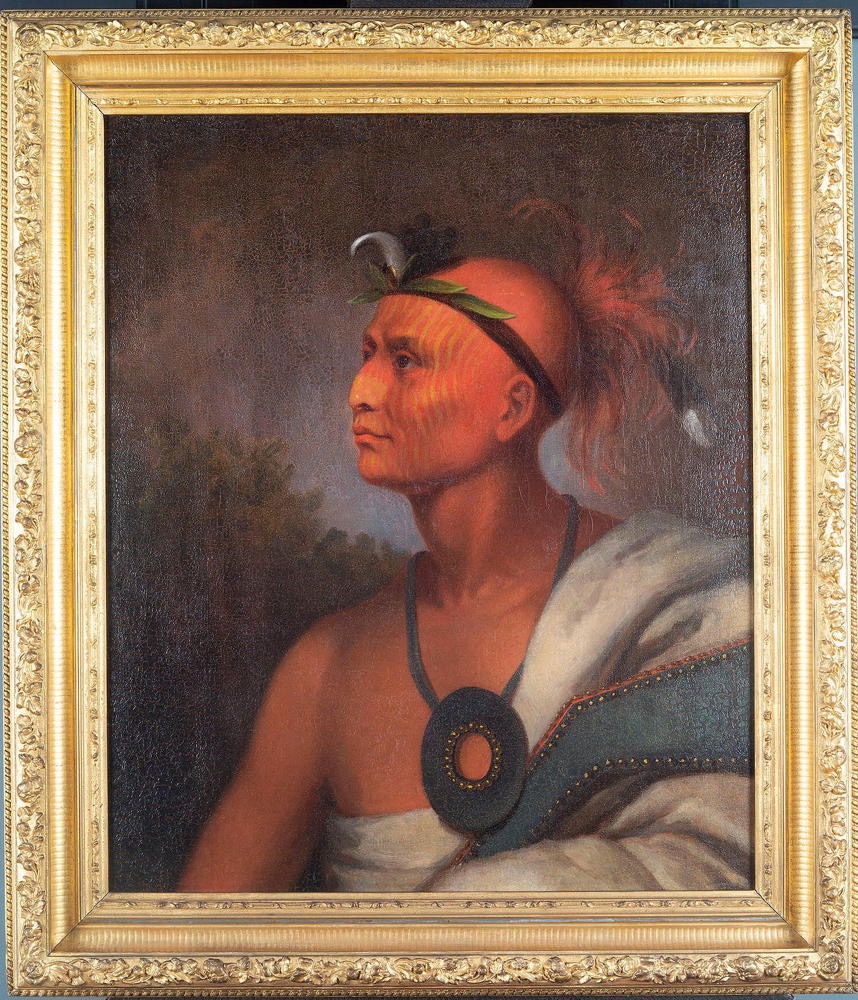Ideological

Henry Inman: [Tah-Col-o-Quoit (Rising Cloud)],
Asakiwaki/Sauk Warrior;
representative of the Sauk and Fox coalition
Former Title: [Tah (sha)-col-o-quoit], Sauk and Fox Delegate
(c. 1832-1834)
" … promising greatness as if from the mouth of God."
Perhaps the primary difference between what most of us might recognize as regular order and the MAGA World manifesting before us might be best acknowledged as the fundamental difference between policy-driven and ideology-driven governance. Policy-driven governance relies on agreements negotiated between often opposing viewpoints, as embodied in the 'Out of Many, One' notion, codified as the official motto of this nation. This characterization deftly encapsulates democracy in practice. It's naturally full of contention but also well-practiced as resolution. For every disagreement, some compromise might exist, and the primary purpose of self-governance must be to find these and agree to live within them. Absolutism cannot coexist within democracy's inherent pluralism. There's right, wrong, and left: right or wrong, what matters might always be whatever's left after the passionate argument.
What's left is policy, a statement of agreement intended to transcend right and wrong. In a democracy, this statement defines justice. Disagreements often linger around the margins of every negotiated settlement, and future proceedings might well reopen an argument and come to different conclusions. However, once an agreement becomes law, it stands as a self-evident truth, regardless of how vehemently anyone might have formerly opposed it. Some issues never seem to resolve, though. Slavery and the formal oppression of minorities retained many adherents even after a war was fought to resolve the differences. Racism persisted, and dissent remained common, seemingly ever after. A portion of the population never accepted the conclusion and continued practicing what amounted to illegalities under a so-called higher authority. That authority is what we refer to as Ideology, and their argument in favor of such behavior is Ideological.
Unlike Policy, Ideological governance anchors itself on what scholars refer to as firm belief. Firm belief is unshakable. It remains impermeable to any opposing logic or argument. It stands as the immutable truth. There can be no successful argument against any Ideological belief. It's settled. Those oppressed by it are told to get over their opposition, to give in to the superior perspective. Often, God gets cited as the author of the firm belief. With sponsors like that, any defense against opposition seems warranted. In Ideological systems, enforcement replaces agreement. It honestly never matters to those holding the firm belief whether you share their beliefs, for they believe their belief transcends mere belief. It is based on the ultimate truth, and as such, it introduces the infinite into every otherwise finite argument. Any opposition is so obviously wrong that it undermines its own position. Those who cannot get with the program become enemies of God. The self-proclaimed righteous represent positive evolution by undermining all opposition.
Andrew Jackson came closest to implementing an Ideological administration. His Indian Removal Act of 1830 promoted the notion of manifest destiny into a national religion that justified worse than any Nazi ever imagined inflicting, for all the very best reasons. His purpose was national salvation, which, to the uninitiated, was often mistaken for certain damnation. Whenever a leader started listening to God, some fresh Hell has reliably appeared. The democratic notion acknowledged this paradox, separating church and state. Desegregation and abortion wrenched apart this noble distinction as the Ideologically self-righteous chose to listen to God rather than to each other or reason. The results came with stunning stereotypy, just as they had every time before. Heaven on Earth seems indistinguishable from Hell, and sure does seem to require an awful lot of police without insignias and vehicles without license plates. Illegal aliens serve as the allegory this time, filled in before by native Americans, African-born enslaved people, and Jews. Next time it could be you.
Utopias seem to serve as civilization's rubber worm. They goad reflex reactions. Promise us some sort of Heaven, and we cannot seem to resist nibbling. We're reliably hooked and only become remorseful later. Not even those holding high positions within the Ideological hierarchy ever manage to escape their terrible destiny. They earn their places in history, though seemingly accidentally. Those who worship with Ideological passion always undermine their devotion. They never seem to learn, and this behavior traces back to the very edge of prehistory. The MAGAs of today have forebears who inflicted tyranny upon ancient Assyrians. Assyrians had inflicted tyranny on somebody else before inheriting the terror themselves. Only democracy, practiced skeptically, seems capable of disrupting this pattern. Still, it remains vulnerable, too, to any Jehu with a gilded calf or a bright red ball cap promising greatness as if from the mouth of God.
©2025 by David A. Schmaltz - all rights reserved


